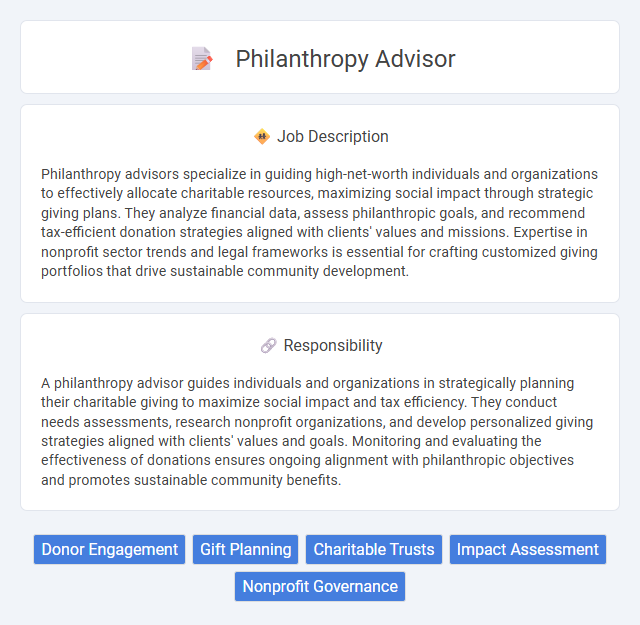
Philanthropy advisors specialize in guiding high-net-worth individuals and organizations to effectively allocate charitable resources, maximizing social impact through strategic giving plans. They analyze financial data, assess philanthropic goals, and recommend tax-efficient donation strategies aligned with clients' values and missions. Expertise in nonprofit sector trends and legal frameworks is essential for crafting customized giving portfolios that drive sustainable community development.
Individuals who possess strong empathy and a genuine interest in helping others may be well-suited for a philanthropy advisor role, as the job involves guiding donors toward impactful charitable giving. Those comfortable with networking and strategic planning might find the responsibilities align with their skills, although candidates who prefer solitary or highly structured tasks may struggle in this dynamic and people-oriented environment. The probability of success increases for those who are adaptable and passionate about social causes, as these qualities are often essential for effective philanthropy advising.
Qualification
A philanthropy advisor requires a strong background in nonprofit management, finance, and strategic giving to guide clients effectively. Essential qualifications include a bachelor's degree in nonprofit management, social work, or finance, with many employers preferring a master's degree or certifications such as the Certified Financial Planner (CFP) or Chartered Advisor in Philanthropy (CAP). Proven experience in donor relations, grant management, and knowledge of tax implications related to charitable contributions significantly enhances a candidate's effectiveness in this role.
Responsibility
A philanthropy advisor guides individuals and organizations in strategically planning their charitable giving to maximize social impact and tax efficiency. They conduct needs assessments, research nonprofit organizations, and develop personalized giving strategies aligned with clients' values and goals. Monitoring and evaluating the effectiveness of donations ensures ongoing alignment with philanthropic objectives and promotes sustainable community benefits.
Benefit
A Philanthropy advisor likely enhances the impact of charitable giving by strategically aligning donations with clients' values and goals, increasing the effectiveness of their contributions. They probably provide expert guidance on tax-efficient giving, potentially maximizing financial benefits while supporting meaningful causes. This role also tends to facilitate long-term legacy planning, ensuring clients' philanthropic efforts create enduring positive change.
Challenge
Philanthropy advisor roles likely involve navigating complex donor motivations and aligning charitable goals with impactful strategies. The challenge may reside in balancing diverse stakeholder expectations while ensuring measurable social outcomes. Adapting to evolving philanthropic trends and regulatory environments could require continuous learning and strategic flexibility.
Career Advancement
Philanthropy advisors guide high-net-worth individuals and organizations in strategic charitable giving, leveraging expertise in nonprofit sectors and tax law to maximize social impact. Career advancement in this field often involves gaining certifications such as CFRE (Certified Fund Raising Executive) and building a robust network within philanthropic and financial communities. Progression typically leads to senior advisory roles, portfolio management positions, or leadership in philanthropic consulting firms.
Key Terms
Donor Engagement
Philanthropy advisors specialize in donor engagement by developing tailored strategies to build lasting relationships and maximize philanthropic impact. They analyze donor interests and philanthropic goals to craft personalized giving opportunities that align with both the donor's values and the organization's mission. Effective communication, stewardship, and impact reporting are central to sustaining donor commitment and fostering long-term support.
Gift Planning
Gift planning in philanthropy advisory involves designing tailored strategies to maximize charitable donations while optimizing tax benefits for donors. Advisors analyze financial portfolios and donor goals to create planned giving options such as bequests, charitable remainder trusts, and gift annuities. Expertise in tax laws, nonprofit regulations, and donor relations is essential to facilitate impactful and sustainable philanthropy.
Charitable Trusts
Philanthropy advisors specializing in charitable trusts guide clients in establishing and managing these legal entities to maximize tax benefits and ensure long-term philanthropic impact. They provide expertise on trust structures such as charitable remainder trusts (CRTs) and charitable lead trusts (CLTs), tailoring strategies to align with donors' financial goals and charitable intents. Effective administration of charitable trusts requires in-depth knowledge of IRS regulations and ongoing compliance to preserve both the trust's assets and its mission-driven distributions.
Impact Assessment
A philanthropy advisor specializing in impact assessment evaluates the effectiveness and social return on investment of charitable initiatives, ensuring donations achieve measurable outcomes. They utilize data analytics and qualitative research to measure program performance against established goals, helping donors align contributions with cause-driven results. Expertise in impact frameworks and reporting tools enables these advisors to guide strategic giving, optimizing philanthropic impact and transparency.
Nonprofit Governance
Philanthropy advisors specializing in nonprofit governance provide strategic guidance to ensure organizations adhere to legal requirements and ethical standards. They help boards implement effective policies, enhance transparency, and strengthen accountability to donors and stakeholders. Expertise in risk management and compliance supports sustainable growth and maximizes social impact.
 kuljobs.com
kuljobs.com